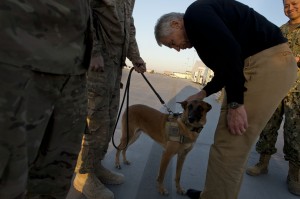Major Human Rights Victory: South Korea Halts Shipment of Tear Gas to Bahrain
Last fall, a leaked document showed that Bahrain intended to make a huge purchase of tear gas. In response, Bahrain Watch and a number of other human rights groups organized a movement around the Stop the Shipment campaign. The movement gained many human rights, foreign policy and celebrity supporters. Once it became clear that Bahrain was focusing on South Korea as the source for the tear gas, the campaign also focused there, sending hundreds of thousands of emails to South Korean companies and government officials.
Today, that effort has proven successful:
South Korea has ordered companies to suspend tear gas exports to Bahrain amid pressure from human rights groups, officials said Wednesday.
The state-run Defense Acquisition Program Administration instructed two companies not to ship tear gas to the Gulf state after they inquired about possible exports, agency officials said.
It turns out that the shipment was going to be even bigger than the leaked document suggested. From Bahrain Watch’s press release:
The shipment was believed to comprise in excess of 1.6 million rounds of tear gas based on a leaked tender document from a source close to Bahrain’s Ministry of Interior. However, in today’s Financial Times article DaeKwang’s CEO said that as part of the deal, which was worth USD $28 million, the Bahraini government was planning to buy 3 million tear gas canisters – around 4 canisters for each Bahraini citizen. DAPA’s decision to cease exports means that this tear gas will not reach Bahrain.
Wow. Four tear gas canisters for each citizen of the country. The press release continues, giving us the horrific details of violent repression of Bahrain’s citizens:
South Korea joins other countries including the United States and United Kingdom, who have already stopped tear gas exports to Bahrain due to human rights concerns. Since 2011, at least 39 deaths in Bahrain have been linked to misuse of tear gas, according to data compiled by Physicians for Human Rights (PHR). The deaths include 14 year old Ali Jawad al-Shaikh who was shot in the back of his neck with a tear gas canister, and 15 year old Sayed Hashim Saeed, also shot in his neck with a tear gas canister at close range. No police officer or other government official in Bahrain has been held accountable for these or any other abuses due to the systematic misuse of tear gas, despite serious concerns raised by the United Nations Human Rights Council and the well-documented accounts that described the Bahraini government’s use of tear gas as “unnecessary, indiscriminate” and “lethal”.
Even though the US no longer exports tear gas to Bahrain, a US export leads many of Bahrain’s most repressive actions. John Timoney now heads Bahrain’s efforts to “reform” its police tactics. Shortly after he arrived there, Bahrain banned all protests and the death toll continued to mount. [Will Ray Kelly join Timoney soon? It would seem like such a natural fit for him.]
Stopping the tear gas shipment is a major victory for human rights in Bahrain, but Bahrain’s government continues its violent repression in many ways beyond tear gas. From Amnesty International’s 2013 report on Bahrain, we have this on incarceration of teens: Read more →

